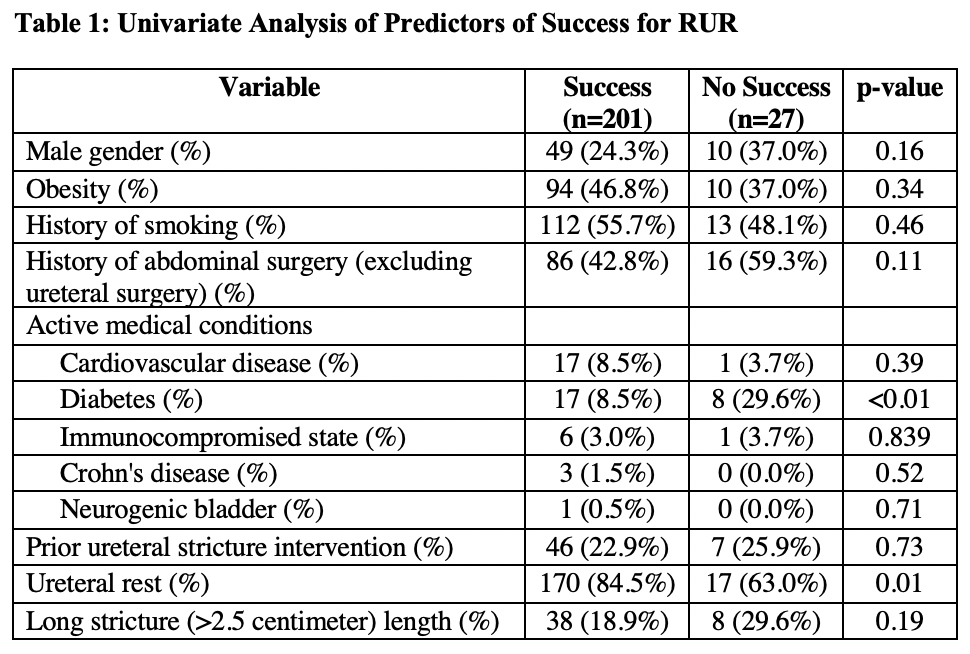Back
Poster, Podium & Video Sessions
Moderated Poster
MP25: Trauma/Reconstruction/Diversion: Ureter (including Pyeloplasty) and Bladder Reconstruction (including fistula), Augmentation, Substitution, Diversion
MP25-11: Predictors of Surgical Success for Robotic Ureteral Reconstruction of Proximal and Middle Ureteral Strictures
Saturday, May 14, 2022
10:30 AM – 11:45 AM
Location: Room 228
Matthew Lee*, Philadelphia, PA, Ziho Lee, Chicago, IL, Randall Lee, David Strauss, Rohit Reddy, Philadelphia, PA, Lee C Zhao, New York, NY, Michael D Stifelman, Hackensack, NJ, Daniel Eun, Philadelphia, PA

Matthew Lee, MD,MBA
Temple University
Poster Presenter(s)
Introduction: We investigate predictors of surgical success for patients undergoing robotic ureteral reconstruction (RUR) for proximal and middle ureteral stricture disease.
Methods: We retrospectively reviewed our multi-institutional Collaborative of Reconstructive Robotic Ureteral Surgery (CORRUS) database to identify all consecutive patients undergoing RUR for proximal and/or middle ureteral stricture disease between 04/2012-01/2019. The specific reconstruction technique was determined by the primary surgeon based on clinical history and intraoperative findings. Patients were grouped according to whether or not they were surgical successful. Preoperative variables between both groups were compared using chi-square tests. All independent variables with associations of p<0.2 then underwent a binary logistic regression analysis to determine predictive variables of success for RUR (p=0.05 was considered statistically significant).
Results: Overall, 228 patients met inclusion criteria. Univariate analysis (Table 1) showed that there were a lower proportion of patients with diabetes (8.5% versus 29.6%, p<0.01) and a higher proportion of patients who underwent ureteral rest (84.5% versus 63.0%, p=0.01) in the surgical success group. Multivariate logistic regression analysis (Table 2) further revealed that patients with diabetes were 3.74 times more at risk (p=0.01, CI: 1.35-10.37) of failing to achieve surgical success compared to those without diabetes. Patients undergoing ureteral rest prior to RUR were 2.68 times more likely (p=0.04, CI: 1.05-6.82) to achieve surgical success compared to those who did not undergo ureteral rest.
Conclusions: In patients undergoing RUR for management of proximal and middle ureteral strictures, preoperative factors such as the absence of diabetes and the implementation of ureteral rest may optimize surgical outcomes.
Source of Funding: None


Methods: We retrospectively reviewed our multi-institutional Collaborative of Reconstructive Robotic Ureteral Surgery (CORRUS) database to identify all consecutive patients undergoing RUR for proximal and/or middle ureteral stricture disease between 04/2012-01/2019. The specific reconstruction technique was determined by the primary surgeon based on clinical history and intraoperative findings. Patients were grouped according to whether or not they were surgical successful. Preoperative variables between both groups were compared using chi-square tests. All independent variables with associations of p<0.2 then underwent a binary logistic regression analysis to determine predictive variables of success for RUR (p=0.05 was considered statistically significant).
Results: Overall, 228 patients met inclusion criteria. Univariate analysis (Table 1) showed that there were a lower proportion of patients with diabetes (8.5% versus 29.6%, p<0.01) and a higher proportion of patients who underwent ureteral rest (84.5% versus 63.0%, p=0.01) in the surgical success group. Multivariate logistic regression analysis (Table 2) further revealed that patients with diabetes were 3.74 times more at risk (p=0.01, CI: 1.35-10.37) of failing to achieve surgical success compared to those without diabetes. Patients undergoing ureteral rest prior to RUR were 2.68 times more likely (p=0.04, CI: 1.05-6.82) to achieve surgical success compared to those who did not undergo ureteral rest.
Conclusions: In patients undergoing RUR for management of proximal and middle ureteral strictures, preoperative factors such as the absence of diabetes and the implementation of ureteral rest may optimize surgical outcomes.
Source of Funding: None



.jpg)
.jpg)